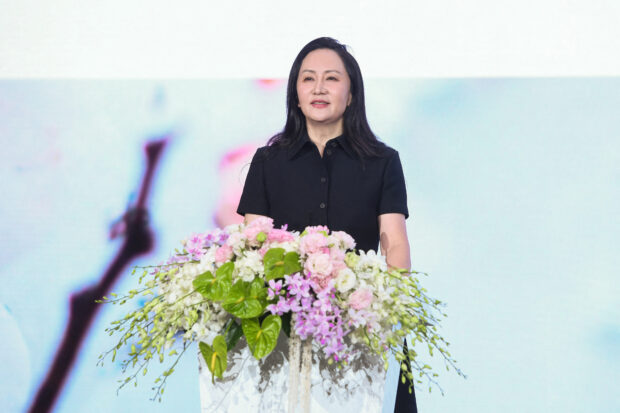
Huawei’s chief financial officer Meng Wanzhou speaks during the Huawei 2022 Annual Report press conference in Shenzhen, in China’s southern Guangdong province on March 31, 2023. (Photo by AFP) / China OUT
BEIJING, China -The daughter of Huawei’s billionaire founder, Meng Wanzhou will take over as rotating chairwoman as the Chinese tech giant enters choppy waters, with profits plummeting under US sanctions.
The Washington-led pressure campaign has contributed to Huawei losing its top spot in the smartphone market and has throttled its supply chains.
After Huawei’s Friday announcement that its 2022 net profits had plunged 69 percent compared to the previous year, Meng struck a defiant tone at a press conference.
“We might not be successful in the end, but being placed in a fatal impasse, we have no choice but to go all in and fight, with all hands on deck,” she said.
The 51-year-old is not new to being on the front line of the US-China tech war.
In 2018, she was arrested in Canada at the behest of the United States on fraud charges relating to her alleged efforts to hide violations of US sanctions on Iran involving Huawei affiliate Skycom.
She remained under house arrest in Vancouver for almost three years while fighting extradition, with the case becoming a major thorn in relations between the three countries.
She was allowed to return to China in September 2021, and in December 2022, the US Justice Department dropped all charges against her.
Huawei under pressure
Huawei has been repeatedly targeted by Washington in recent years over cybersecurity and espionage concerns.
The administration of former president Donald Trump effectively barred US companies from doing business with the firm, and his successor Joe Biden has slapped on further sanctions, including a ban on sales of new Huawei equipment in the United States.
https://business.inquirer.net/384484/us-stops-granting-export-licenses-for-chinas-huawei-sources
Washington has also put controls on the export of sophisticated computer components and chip fabrication equipment to Huawei and other Chinese companies.
Huawei says it has replaced thousands of product components banned for export by the United States with homegrown versions, but it still relies on US chips for many of its 4G smartphones and consumer gadgets.
Consequently, the company is looking to expand its lines of business and develop new supply chains.
Meng on Friday identified Huawei’s cloud business as a key area of growth.
It is also looking into building telecom infrastructure for solar farms and makers of driverless cars, and investing heavily in Africa and emerging economies in South and Southeast Asia.
‘Humble’ beginning
Despite being internally known as Huawei’s “princess”, Meng is said to be approachable and self-deprecating.
According to Chinese media, she started off as a secretary at Huawei and kept her head down for years, to such an extent that few knew her father was founder Ren Zhengfei.
This may have been aided by the fact that she took her mother’s surname from a young age, for reasons that remain unclear.
Ren, a former army engineer, founded Huawei with a few thousand dollars in 1987, growing it into one of the world’s leading suppliers of hardware for telecommunications networks.
“He is a CEO at work, and a father at home,” Meng once said, to emphasize that competence, not connections, determined one’s path at Huawei.
Huawei credits Meng for reorganizing the company’s financial and IT architecture, beginning in the early 2000s, so that the company could cope with its rapid global growth.
Meng herself recounted how initially, she and other bookkeepers had to bind the company’s financial records by hand each month, according to a readout of a speech she gave at her former high school last year.
Meng will lead the company for six months until September 30.
Huawei, which is not publicly listed, has two other rotating chairs — Eric Xu and Ken Hu.
Meng said Friday that the company’s future, as it navigates one of its roughest patches yet, would depend on its “collective leadership”.
“In times of pressure, we press on –- with confidence,” she said.
https://business.inquirer.net/358688/shift-in-focus-from-pursuing-scale-to-ensuring-profits-cash-flow